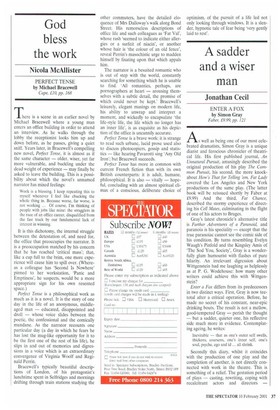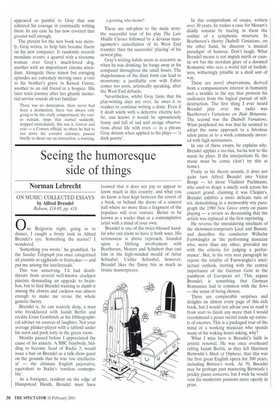A sadder and a wiser man
Jonathan Cecil
ENTER A FOX by Simon Gray Faber, £9.99, pp. 121 As well as being one of our most celebrated dramatists, Simon Gray is a unique diarist and ferocious chronicler of theatrical life. His first published journal, An Unnatural Pursuit, amusingly described the original production of his play The Common Pursuit, his second, the more knockabout How's That for Telling 'em, Fat Lady covered the Los Angeles and New York productions of the same play. (The latter book will be reissued shortly by Faber at £9.99) And the third, Fat Chance, described the stormy experience of directing his Cell Mates, culminating in the flight of one of his actors to Bruges.
Gray's latest chronicle's alternative title is Further Adventures of a Paranoid, and paranoia is his speciality — except that the true paranoiac cannot see the comic side of his condition. By turns resembling Evelyn Waugh's Pinfold and the Kingsley Amis of 'The Sod You, Society', Gray is a wonderfully glum humourist with flashes of pure hilarity. An irrelevant digression about Wittgenstein had me laughing as helplessly as at P. G. Wodehouse: how many other writers could achieve this with Wittgenstein?
Enter a Fox differs from its predecessors in two distinct ways. First, Gray is now teetotal after a critical operation. Before, he made no secret of his constant, near-epic drinking bouts. The result is not a mellow, good-tempered Gray — perish the thought — but a sadder, quieter one, his reflective side much more in evidence. Contemplating ageing, he writes:
Inevitable — that as one's outer self swells, thickens, coarsens, one's inner self, one's soul, psyche, ego and id ... all shrink.
Secondly this diary, whilst it coincides with the production of one play and the completion of another, is not directly connected with work in the theatre. This is something of a relief. The gestation period of plays — casting, rewriting, coping with recalcitrant actors and directors — appeared so painful to Gray that one admired his courage in continually writing them. In any case he has now covered that ground well enough.
The pretext for the new book was merely, Gray writes, to help him become fluent on his new computer. It randomly records mundane events: a quarrel with a tiresome woman over Gray's much-loved dog, another with an impertinent cinema attendant. Alongside these minor but enraging episodes are extremely moving ones: a visit to his brother's grave in Kerisal Green, another to an old friend in a hospice. His later train journey after her ghastly memorial service sounds all too familiar:
There was no destination, there never had been a destination, there was always only going to be this stuffy compartment, the voices outside, stops that started suddenly, stopped immediately, this was it, forever and ever — a Connex official, so obese he had to run down the corridor sideways, paused briefly to shout out an instruction, a warning, a greeting, who knows?
These are sub-plots to the main story: the successful tour of his play The Late Middle Classes followed by a devious management's cancellation of its West End transfer; then the successful 'placing' of his newest play.
Gray's writing habits seem as eccentric as when he was drinking: he bangs away at his computer throughout the small hours. The shapelessness of the diary form can lead to monotony: a justifiable row with Faber comes too soon, artistically speaking, after the West End debacle.
Nevertheless, whilst Gray hints that his play-writing days are over, he owes it to readers to continue writing a diary. Even if it dealt solely with a defective electric kettle, one knows it would be uproariously funny and full of sad and savage observations about life with even — in a phrase Gray detests when applied to his plays — 'a dark poetry'. In this compendium of essays, written over 30 years, he makes a case for Mozart's diddly sonatas by tracing in them the outline of a symphonic structure. In Beethoven's thorny Diabelli Variations, on the other hand, he discerns 'a musical paradigm' of humour. Don't laugh. What Brendel means is not impish mirth or caustic wit but the mordant glare of a doomed Romantic who sees a world full of foolishness, witheringly pitiable in a droll sort of way.
These are novel observations, derived from a compassionate interest in humanity and a twinkle in the eye that protects his audiences from the logical pursuit of selfdestruction. The first thing I ever heard Brendel play over the radio was Beethoven's Variations on Rule Britannia. The second was the Diabelli Variations. What perplexed me was that he seemed to adopt the same approach to a frivolous salon piece as to a work commonly invested with high seriousness.
In one of these essays, he explains why. Brendel applies a tee-hee, ha-ha test to the music he plays. If the interjections fit, the music must be comic (don't try this at home).
Fruity as his theory sounds, it does not quite turn Alfred Brendel into Victor Borge — let alone Vladimir Pachmann, who used to drape a smelly sock across his concert grand, claiming it was Chopin's. Brendel exhibits a more delicate turn of wit, demolishing in a memorably wry paragraph the 1980 New Grove entry on piano playing — a review so devastating that the article was replaced at the first reprinting.
He reveres the smouldering intellects of the showmen-composers Liszt and Busoni, and describes the conductor Wilhelm Furtwangler as 'the performing musician who, more than any other, provided me with the criteria for judging a performance'. But, in the very next paragraph he rejects the totality of Furtwangler's intellectual outlook, starting with the central importance of the German Geist in the pantheon of European art. This, argues Brendel, is something that German Romantics had in common with the Jews — the sense of being chosen.
There are comparable surprises and delights on almost every page of this rich book, but I would not advise you to read it from start to finish any more than I would recommend a piano recital made up entirely of encores. This is a packaged tour of the mind of a working musician who spends many of his waking hours asking, why?
What I miss here is Brendel's faith in artistic renewal. He was once overheard telling Isaiah Berlin, as they left Harrison Birtwistle's Mask of Orpheus, that this was the first great English opera for 300 years, including Britten's work. At 70, Brendel may be perhaps past mastering Birtwistle's prickly piano concerto, but I wish he would vent his modernist passions more openly in print.



































































 Previous page
Previous page